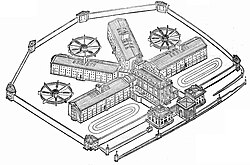
Back Kritische Kriminologie German Criminología crítica Spanish Criminologia critica Italian Criminologia crítica Portuguese Kritisk kriminologi Swedish
This article has multiple issues. Please help improve it or discuss these issues on the talk page. (Learn how and when to remove these messages)
|
| Criminology and penology |
|---|
 |
Critical criminology applies critical theory to criminology. Critical criminology examines the genesis of crime and the nature of justice in relation to power, privilege, and social status. These include factors such as class, race, gender, and sexuality. Legal and penal systems are understood to reproduce and uphold systems of social inequality.[1][2] Additionally, critical criminology works to uncover possible biases within traditional criminological research.[3]
Critical criminology sees crime as a product of oppression of workers – in particular, those in greatest poverty – and less-advantaged groups within society, such as women and ethnic minorities, are seen to be the most likely to suffer oppressive social relations based upon class division, sexism and racism.[4] More simply, critical criminology can be understood as an area of criminology that focuses on the impacts of power, domination, and oppression in ways that are often neglected by mainstream criminology. Critical criminologists focus on the larger systemic factors of crime.
- ^ Online Dictionary of the Social Sciences, Critical Criminology. Athabasca University and ICAAP. Retrieved on: 2011-10-30.
- ^ Meyer, Doug (March 2014). "Resisting Hate Crime Discourse: Queer and Intersectional Challenges to Neoliberal Hate Crime Laws". Critical Criminology. 22 (1): 113–125. doi:10.1007/s10612-013-9228-x. S2CID 143546829.
- ^ Uggen, Christopher; Inderbitzin, Michelle (2010). "Public criminologies". Criminology & Public Policy. 9 (4): 725–749. doi:10.1111/j.1745-9133.2010.00666.x.
Uggen, C. and Inderbitzin, M. (2010), Public criminologies. Criminology & Public Policy, 9: 725-749. doi:10.1111/j.1745-9133.2010.00666.x
- ^ Hopkins Burke, R. (2001) An Introduction to Criminological Theory, Cullompton: Willan pg.173
© MMXXIII Rich X Search. We shall prevail. All rights reserved. Rich X Search